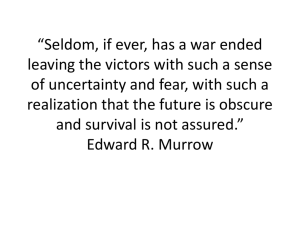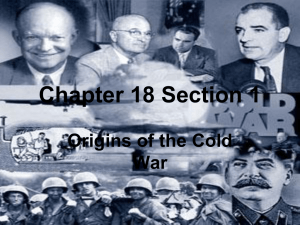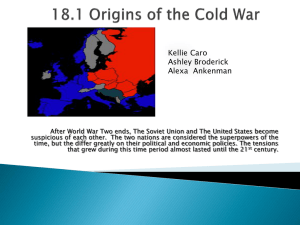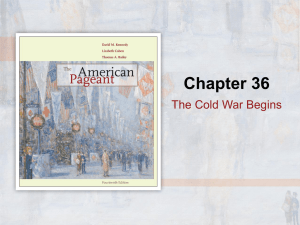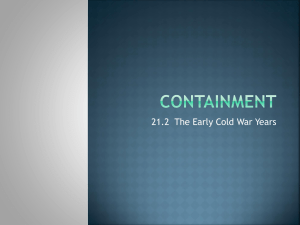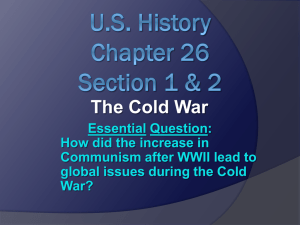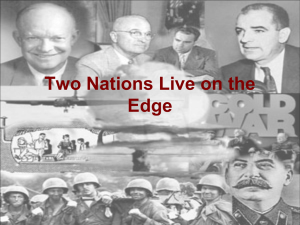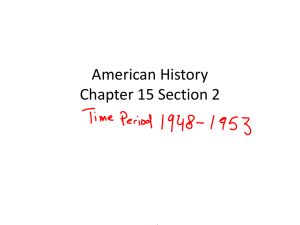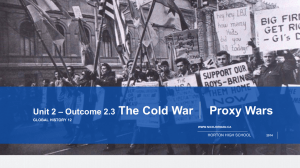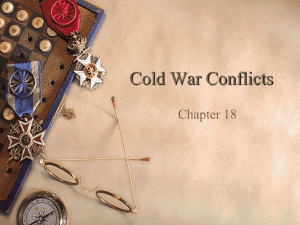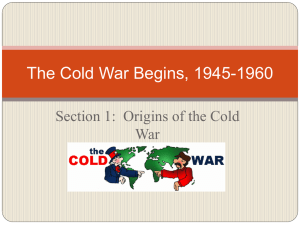Chapter 18 Section 1
advertisement
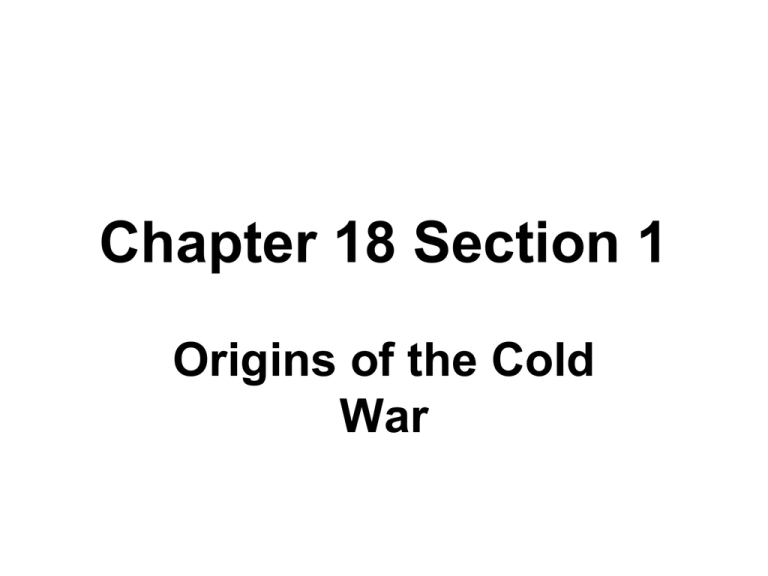
Chapter 18 Section 1 Origins of the Cold War Former Allies Crash • Problems building between the US and SU before and during WWII • Economic and political systems incompatible • Resentments had built up over previous events Former Allies Crash • Soviet Communism: – State controlled all property – All economic activity – Totalitarian Communist Party allowed no opposition party – Resented the US for not recognizing communist govmt for 16 years Former Allies Crash • The United States: – Capitalist system – Private citizens controlled almost all property and economic activity – Elect politicians from competing political parties-unlimited number of political parties Former Allies Crash • US furious at StalinSigned nonaggression pact with Hitler in 1939 • Stalin angry with the US for not opening a second front in Europe until 1944 • Stalin also angry that we kept the development of the atomic bomb a secret Truman Becomes President • Key American figure in early part of the Cold War • Became President when FDR died • 82 days as Vice President-met with FDR only twice Truman Becomes President • FDR left Truman uninformed on military matters • Truman knew nothing about the development of the atomic bomb Truman Becomes President • With the war ending Truman would have to 1. Make difficult military decisions 2. Deal with world leaders of greater experience 1. Churchill 2. Stalin Potsdam Conference • Truman’s 1st meeting with other major world leaders-Potsdam, July 1945 • By this time, the Soviets had broken their promise for free elections in Poland Potsdam Conference • Not only did the Soviets not allow free elections in Poland, but they banned democratic parties • The was a violation of Poland’s rights according to Truman Potsdam Conference • Truman pushed for free elections-Stalin refused • With the Soviet army occupying Eastern Europe, the West could do little Tension Mounts • Refusal to allow free elections convinced Truman that American and Soviet goals were at odds • Truman feared giving Stalin too much land and reparations – Soviets wanted all of German stripped of industry Tension Mounts • Americans and British opposed Soviet demands • Agreed that each occupying nation could collect reparations from the German zone it occupied Tension Mounts • At odds over Eastern Europe • US wanted Eastern Europe to stay open to trade • US wanted to be able to sell their goods to Eastern European Nations Soviets Tighten Grips on Eastern Europe • Soviets felt justified to stay in Eastern Europe • Lost more than 20 million in WWII and felt vulnerable to attack from the west • Needed friendly neighbors Soviets Tighten Grips on Eastern Europe • Stalin propped up communist governments in Eastern European nations • The Satellite Nations- were countries dependent upon and dominated by the Soviet Union Soviets Tighten Grips on Eastern Europe • Stalin seized the industry of these nations to rebuild the Soviet Union • 1946- Stalin announces that communism and capitalism are incompatible – Stated that war was inevitable – US say this as a declaration of war United States Establishes a Policy of Containment • US institutes a policy of Containment towards the Soviet Union – An effort to block the Soviets’ attempts to spread their influence United States Establishes a Policy of Containment • Containment Policy worked by: – Creating alliances – Supporting weaker nations This policy guided the Truman administration’s foreign policy United States Establishes a Policy of Containment • March 1946 Churchill gives his “Iron Curtain” speech • Stalin stated that Churchill’s words were a “call to war” Cold War in Europe • Conflicting US and Soviet aims in Eastern Europe led to the Cold War – State of hostility short of direct military confrontation between the 2 superpowers until the breakup of the Soviet Union in 1991 Cold War in Europe • During the Cold War, the US and Soviet Union tried to spread their economic and political influence wherever they could – Eventually spread to Asia, Africa, and Latin America The Truman Doctrine • US 1st tried to contain communism in Greece and Turkey • Britain was helping to prevent a communist takeover-but could no longer afford it • Asked the US to take over the responsibility The Truman Doctrine • US spent $400 million to help Greece and Turkey • Truman DoctrineThe US should support free peoples throughout the world who were resisting takeovers by “armed minorities” or “outside pressures” Marshall Plan • After WWII, Europe was in economic chaos • Many homeless with no jobs and no where to go • Governments had to figure out where to out these people Marshall Plan • • • • 1946-47-harsh winter Food shortages Fuel shortages British could only use electricity a few hours a day • British rations lower than during the war Marshall Plan • June 1947 US Secretary of State George Marshall proposed that the US help • US would send aid to all European Nations that needed it • Known as the Marshall Plan Marshall Plan • Congress debated plan for several months • Then… • February 1948 Soviets invaded Czechoslovakia – Took over the country Marshall Plan • Invasions showed the need for congress to move quickly and help create strong, stable governments in Europe – To resist communism – Congress quickly approved Marshall Plan Marshall Plan • The Plan was a success • By 1952 Western Europe was flourishing • Communist parties lost their appeal to voters Superpowers Struggle Over Germany • Europe starts to get back on its feet • Western allies and Soviets arguing over German reunification • Soviets want Germany weak and divided • West wants stable productive Germany Berlin Airlift • 1948-Western Zones combine into 1 nation • Soviets respond by holding Berlin Hostage • Berlin divided into 4 zones as well • Lays deep in Soviet Zone Berlin Airlift • Soviets cut off all access to Berlin • No supplies could get in • City faced starvation unless Western nations would surrender Berlin Berlin Airlift • Americans and British started the Berlin Airlift-fly food and supplies to West Berlin • Lasted 327 daysplanes landed and took off every few minutes Berlin Airlift • 277,000 flights made delivering 2.3 million tons of supplies • West Berlin survived • American prestige grew in the world • Soviet prestige dropped • May 1949 Soviets lift blockade Berlin Airlift • May 1949 West Germany becomes known as the Federal Republic of Germany with its capital at Bonn • East Germany becomes German Democratic Republic with its capital in East Berlin NATO • Blockade increased fear of Soviet aggression • In response, 10 western European nations, the US and Canada formed a defensive military alliance-NATO NATO • NATO-North Atlantic Treaty Organization • An attack on one regarded as an attack on all • First time the US entered a military alliance in peacetime
